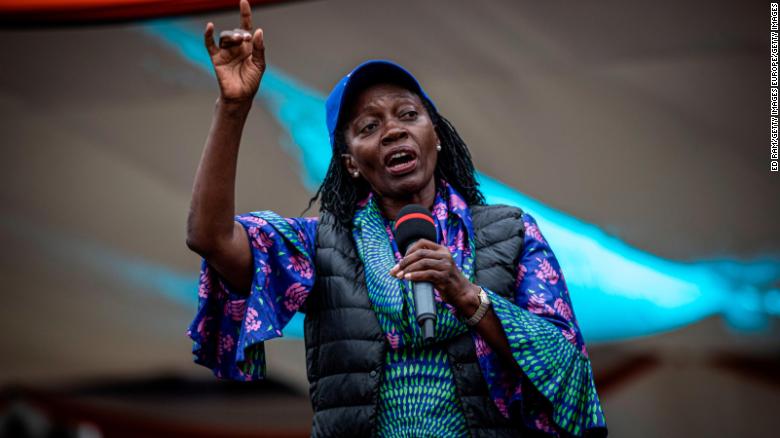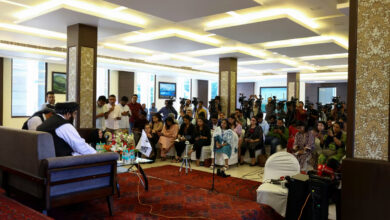
Lamu, Kenya (CNN) – Just before sunset, Umra Omar boards a speedboat that will take her around the historic Lamu channel for meetings with voters. As her boat zooms past idyllic islands and arrives at shore 30 minutes later, dozens of women and children rush to greet a candidate they hope will be their next governor.
Omar is native to Lamu, a conservative region near the Somali border, best known for its preserved Swahili culture and being a UNESCO heritage site.
“If we’re to address the challenges we’re facing as women, young people, and indigenous communities, we have to take up the political battle as well,” she tells CNN.
The 39-year-old is the coastal county’s first female candidate for the top job. She is among a record number of women running for office in Kenya’s August 9 general election.
Omar is a humanitarian who has in the past been named a CNN Hero for her work with award-winning social enterprise Safari Doctors, which provides basic healthcare in remote areas of Lamu.
She says she is running for office as a natural progression after seven years of providing “band-aid solutions” for poor healthcare.
“Being able to really dig our teeth into the root causes of rural challenges is what definitely propelled us into politics,” Omar says.
But she faces an uphill battle.
Even though women make up nearly half of registered voters, Kenya still has the fewest elected female leaders in East Africa.
A constitutionally mandated gender quota to break the male supermajority in power has consistently failed in the 12 years since it was passed.
But this election could be different.
‘Kenya is ready for women at all levels’
If opposition leader Raila Odinga wins, Kenya could have its first female deputy president in 64-year-old Martha Karua.
When she ran for president on her own in 2013, Karua got less than 1% of the vote, coming a distant sixth behind five men.
In the 25 years since a woman first ran for Kenya’s presidency, this is the closest any has come to the top seat.
Karua bristles when asked if Kenya is ready for a female president like neighboring Tanzania.
“That question suggests that women ought not to be on the ballot, because I have never had anybody question whether Kenyans are ready for yet another male. So that question is in itself discriminatory,” the former Kenyan justice minister tells CNN.
“I think that Kenya is ready for women at all levels.”
Her nomination energized the Odinga campaign and excited many women, some of whom compare her to US Vice-President Kamala Harris.
In her three decades in Kenyan politics, Karua has earned a reputation as a principled politician and the nickname “the Iron Lady” — a moniker she hates.
“That name speaks to the misogyny within society. Strength is not perceived as female, strength is perceived as male,” Karua tells CNN pointing out that it was first used to describe former British Prime Minister Margaret Thatcher, who came to power in 1979.
“It speaks to the misogyny and the patriarchy that rules the world,” she says.
‘A systematic exclusion of women’
Although the number of women entering Kenya’s political sphere has grown over the years, only 23% of seats were held by women in the last parliament. That includes the Woman Representative positions that are exclusively reserved for them — 47 seats out of 349 are currently reserved for women for this position.
“We’re seeing more and more women running, which tells us it has never been a problem about women wanting to participate in politics,” says Marilyn Kamuru, a lawyer and writer on women in politics. “It continues to be a problem about the systematic exclusion of women.”
That exclusion includes financial barriers to competing in notoriously expensive campaigns that can run into hundreds of thousands of dollars, and regular violence employed against women running and even those already serving in office. For example, in 2019, a Kenyan MP was arrested for allegedly slapping a female colleague and calling her names.
“It chills the environment for women, it makes women think again, hold back,” and consider running for lower positions or abandoning their campaigns altogether, Kamuru says.
The latest election cycle has followed the familiar pattern, with many women reporting violence or threats of physical harm and misogyny being used to intimidate them out of the race.
“We’ve had some major, mindblowing character assassination, to the point of discrediting the work that we’ve been doing with Safari Doctors, but we try not to let that distract us,” Omar says.
She laments the propaganda used against her in the race, including taboo accusations such as being an LGBT “recruiter” or a drug dealer to derail her campaign.
It is harder for women in rural parts of Kenya to be involved politically because of socio-cultural barriers, Daisy Amdany, women’s rights advocate and executive director at the Nairobi-based Community Advocacy and Awareness Trust, told CNN affiliate NTV.
“There are certain cultures that don’t even give women the right to keep their voter cards, so you need a man’s permission,” Amdany said. She added that negotiated situations where elders determine who gets to run for office also disadvantage women and they are “more common than you would think.”
Despite the roadblocks to political office, Kenyan women persist. “As long as we remain non-negotiable players the system has to accommodate us,” Kamuru said.
A long shot campaign
The powerful governor role Omar is eying is considered a long shot as only three out of Kenya’s 47 counties are headed by a woman. One recent opinion poll placed her third out of four candidates but she’s not discouraged.
While everyone CNN spoke to in Lamu was aware that she was running, some men felt that she was punching above her weight and should have vied for the less powerful Woman Representative county-wide parliamentary seat.
But 24-year-old Constance Kadzo, owner of a small grocery stall, told CNN she was inspired to see an indigenous Swahili woman running for a top seat.
“I’m voting for her because she’s the only woman who’s brave enough to go up against the men and I know she will fight for us.”




